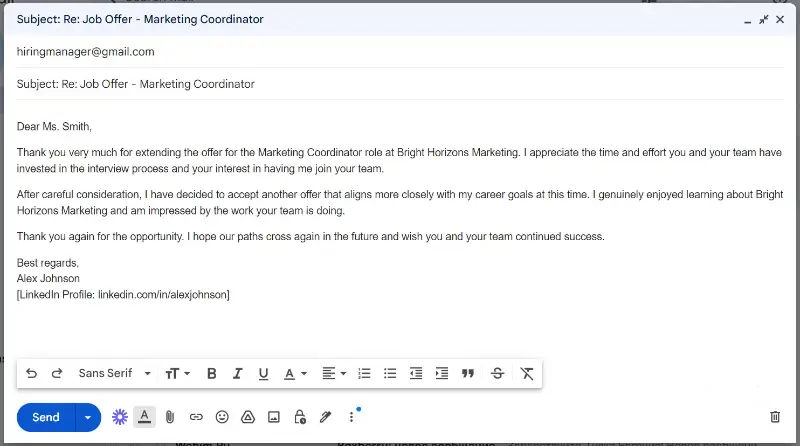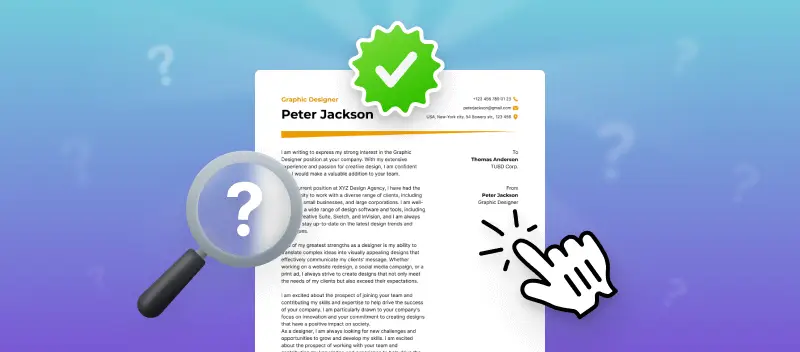Wondering how to list a minor on your resume?
It can be tricky to determine the best way to present your minor, especially when you want to highlight your academic achievements without overwhelming your potential employers.
In this article, we'll walk you through the steps of how to add minor to a resume effectively, ensuring it's presented in a clear and professional manner that supports your career goals.
What are resume major and minor?
A minor is a secondary academic discipline that complements a student’s primary area of study (the major).
It allows you to gain expertise in a different field without the full commitment required for a separate degree. It usually involves fewer courses and credits and can provide additional abilities and knowledge.
| Aspect | Major | Minor |
|---|---|---|
| Definition | The core subject of a degree program. | A supplementary field of study alongside the core subject. |
| Credit Hours Required | Typically 30-50+. | Generally 15-25. |
| Depth of Study | Comprehensive, in-depth exploration of the subject. | More introductory or specialized learning. |
| Role in Degree | Central to the student’s academic journey. | Enhances the primary focus with additional knowledge. |
| Commitment | Requires significant time investment throughout the diploma. | Less time-intensive compared to the major. |
| Impact | Directly shapes career path and professional expertise. | Adds complementary skills or broadens qualifications. |
| Flexibility | Less due to specific requirements. | More room for elective courses and personal interests. |
Do you put your minor on a resume?
Knowing when to include a secondary field of study on your application is essential to ensuring it enhances your qualifications. Here are some situations where mentioning it is beneficial.
When to add minor degree on resume?
1. When It's Relevant to the Job
If it aligns with the role or complements your major, add it. For example, a business major with a focus in marketing can be helpful for marketing roles.2. When It Gives You a Competitive Advantage
A secondary area of study can set you apart. For instance, a foreign language or technical skills can be valuable for specific industries.3. When It Shows Versatility
It can highlight your broad knowledge and well-rounded skills, especially if the job values diverse expertise.
When including your minor in resume may not be necessary?
1. When It's Irrelevant
If it doesn’t relate to the position, leaving it off might be best. For example, a literature focus may not help when applying for an engineering job.2. When Other Experience Is More Relevant
If your work experience or certifications are stronger, focus on those instead.3. When Space Is Limited
If your document is already packed with important details, consider leaving it out to keep things concise.
Where to put minor on your resume?
The "Education" section is typically the best place to include your secondary area of study. Here are a few ways to do it.
1. Next to Your Degree
If the discipline is closely related to your main field or complements your qualifications, list minor on a resume directly beneath your diploma. This keeps things clear and easily accessible.
Bachelor of Arts in Psychology (Minor in Sociology)
University of Springfield, IL | Graduated May 2023
2. Under Relevant Coursework
If specific classes from your secondary focus align with the role you're applying for, add them under a "Relevant Coursework" part. This is particularly helpful when the subjects are directly connected to the position.
Relevant Coursework:
- Research Methods in Sociology
- Advanced Social Theory
- The Sociology of Families
3. In a Separate Resume Section (If It’s Highly Relevant)
If your minor significantly enhances your application or relates directly to the position, consider creating a dedicated block to emphasize it.
Bachelor of Science in Computer Science
University of Cambridge, UK | Graduated June 2024
- Secondary Focus: Business Administration
- Key Courses: Marketing Principles, Corporate Finance, Organizational Behavior
How to put a minor on a resume?
Proper formatting is essential for ensuring your application looks professional and is easy to read. When listing a minor on a resume, you want to make sure it’s clearly visible without overwhelming the primary information.
Spacing
There should be a space between your degree and the minor, using either commas or parentheses to separate them when you write resume. Choose the style that best fits the layout of your document.
Parentheses:
Bachelor of Arts in English (Minor in History)
University of Toronto, ON | Graduated May 2024
Comma:
Bachelor of Science in Computer Science, Minor in Business Administration
University of Melbourne, AU | Graduated December 2022
Both options work well, but choose one style and use it consistently across your document.
- The first one provides a clear visual separation between the main degree and the secondary focus.
- The second offers a cleaner, more compact look, particularly for longer names.
Capitalization
"Minor" should be capitalized, and the name following it too, mirroring how you would treat your main field of study.
Bachelor of Fine Arts (Minor in Digital Design)
University of Sydney, AU | Graduated May 2023
Alignment
Keep everything aligned to the left for consistency, unless you're using a multi-column layout.
Create your professional Resume in 10 minutes for FREE
Build My Resume
Examples of how to list minor on resume
Minor on Resume the Same Line as the Degree
John Smith
john.smith@email.com | (555) 123-4567 | LinkedIn: /in/johnsmithSummary
Motivated and detail-oriented graduate with a Bachelor of Arts in Political Science and a Minor in Economics. Strong background in policy analysis, economic research, and data interpretation. Eager to apply skills in economic strategy and public policy to help organizations solve complex problems.
Education
Bachelor of Arts in Political Science (Minor in Economics)
University of Oxford, UK | Graduated May 2025
- Graduated with Honors, GPA: 3.8/4.0
- Relevant Coursework: Political Economy, Microeconomics, Public Policy Analysis
Experience
Policy Intern
Policy Institute | London, UK | June – August 2024
- Researched and analyzed economic policies and their impacts on public welfare programs, helping to shape future policy initiatives.
- Compiled and synthesized data from multiple sources, presenting findings to senior policy advisors to inform key decisions.
- Collaborated with cross-functional teams to create comprehensive reports for government agencies, aiding in policy reforms.
- Coordinated meetings with policymakers and stakeholders to discuss proposed legislative changes and gather feedback.
Research Assistant
Department of Political Science, University of Oxford, UK | September 2021 – May 2022
- Assisted in analyzing political theories and their application to real-world policy outcomes, contributing to a published academic article.
- Conducted literature reviews and data analysis, supporting the development of new research proposals.
- Managed large data sets, ensuring accuracy and integrity in data collection for research purposes.
- Drafted summaries and reports for research papers, preparing materials for academic conferences.
Skills
- Economic Analysis
- Public Policy Research
- Data Analysis (Excel, SPSS)
- Report Writing
- Critical Thinking
- Stakeholder Engagement
- Presentation and Communication Skills
- Legislative Research
List Minor on Resume in a Separate Line
Minor on Resume Integrated with Relevant Coursework
David Lee
david.lee@email.com | (555) 321-6547 | LinkedIn: /in/davidleeSummary
Detail-driven graduate with a Bachelor of Arts in Psychology and a Minor in Sociology. Experienced in research methodologies, social theory, and data analysis. Seeking a role that leverages my research skills and social sciences knowledge to impact organizational strategies.
Education
Bachelor of Arts in Psychology (Minor in Sociology)
University of California, Los Angeles, CA | Graduated June 2024
Relevant Coursework:
- Social Research Methods
- Sociology of Gender
- Criminal Behavior Analysis
- Developmental Psychology
Experience
Research Assistant
Department of Psychology, UCLA | Los Angeles, CA | September 2024 – Present
- Conduct qualitative and quantitative research on social behaviors, contributing to ongoing studies and projects.
- Analyze large datasets using SPSS and NVivo, identifying trends and patterns in behavioral data.
- Assist professors with literature reviews and the development of research proposals for academic publications.
- Manage participant recruitment, scheduling, and data collection for multiple ongoing research projects.
Volunteer Coordinator
Social Impact Agency | Los Angeles, CA | June – August 2022
- Coordinated community outreach programs, aiming to improve social services for marginalized communities.
- Collected and analyzed feedback from program participants, ensuring continuous improvement of social initiatives.
- Worked with local organizations to organize and execute community events and awareness campaigns.
- Produced reports that highlighted program impact, showcasing key metrics to stakeholders and potential donors.
Skills
- Qualitative Research (Interviews, Focus Groups)
- Quantitative Research (SPSS, NVivo)
- Data Analysis and Interpretation
- Report Writing
- Community Outreach
- Program Development
- Social Media Management
- Nonprofit Strategy and Outreach
Conclusion
Listing your major and minor on your resume can make a significant impact, especially if it complements your degree or adds value to the job you're applying for.
By following the tips and strategies outlined here, you'll be able to present this detail in a way that enhances your qualifications and helps you stand out to employers.
Create your professional Resume in 10 minutes for FREE
Build My Resume







